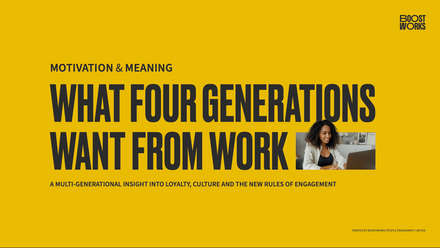Four ways to provide opportunity beyond promotions and raises

Instead, organisations should focus on building a sense of opportunity in other ways employees desire. People want to make a difference in their work. They want to know they are impacting something bigger than themselves. They want to do great work. Currently 63 per cent of employees feel they have the opportunity to do their best work at their current job.
Here are four ways companies can empower employees to do great work and provide a sense of opportunity and growth in the workplace:
1. Give employees a voice
Employees want to feel empowered to influence important decisions at their organisations—to have a seat at the table, to feel like their opinions and input matter and to take ownership in the company’s success. Only 52 per cent of employees feel they influence important decisions at work.
One focus group participant in Toronto describes it this way: “I used to work at Starbucks and they have a lovely way of doing things, where it feels like everyone is equal. Even when you come in at entry level, they say you are at the same level as your boss. They tell you that one day you could even be in the board room. That message really encourages your spirit. It makes you feel like you are a part of something bigger, that you’re doing something for both the company and for yourself.”
The prospect of moving up the org chart and being paid appropriately for their contributions are important factors in an employee’s experience at work, but are not the only opportunities employees crave. In many cases, a promotion or a raise becomes more important because they aren’t given any other sense of opportunity that they, too, can have a seat at the table.
2. Involve employees in special projects
Employees feel a sense of pride when they are handpicked for a special project because of their unique skill set and expertise. And while three out of four employees feel special projects help them grow in ways their day to day jobs cannot, only 50 per cent of employees have the option to work on special projects.
Special projects also give employees visibility with leaders and peers who they may not work with, which helps provide networking and mentorship opportunities. Seventy one percent of employees say special projects connect them with people they normally would not have interacted with.
When employees participate in special projects, they are 50 per cent more likely to believe they learn new and valuable things in their current role. There is a 26 per cent increased sense of opportunity at their organisations, a 25 per cent increase in satisfaction with leadership and a 20 per cent increase in overall job satisfaction.
Also remember to recognise people for their impact on special projects. Only 48 per cent of employees received recognition for their contributions to special projects.
3. Provide a variety of meaningful work
Give employees variety in what they work on, who they work with and how they work. We all want to be challenged—after all, who wants to do the same job, in the same way, day after day? Over half (52 per cent) of Gen Z employees prefer variety in their day-to-day job over a promotion.
Variety also gives employees exposure to different parts of your organisation. It allows them to expand their skills, learn new things and see how their work impacts all areas of the company. Eighty three percent of employees are more likely to stay at their organisation if they are given new problems to solve and projects to work on.
When employees have variety at work, there is a 56 per cent increase in overall job satisfaction, 106 per cent increase in motivation and 114 per cent increase in the sense of opportunity. As you provide employees with a variety of work, ensure that it’s meaningful work: something that connects them to your purpose, makes a difference in your organisation and inspires them.
4. Create a fail-safe environment
Organisations are currently not cultivating an environment where people can safely fail, try new things, or take risks. Only 42 per cent of employees feel they can safely fail in their organisation and 52 per cent feel they have the freedom to try new things.
That being said, true innovation is born out of failure. Organisations should find ways to help employees take educated and calculated risks, fail appropriately and learn from that failure. Recognise and reward attempts, as well as successes. Encourage leaders to share stories about their own failures, which helps employees to learn from previous failures and feel empowered to try new things.
If providing regular promotions and pay raises is difficult in your organisation, give employees the same sense of opportunity by empowering them to do their best work. They’ll feel valued, learn, grow and be able to lead your organisation to success.
For more research and best practices on providing opportunity in the workplace, read our 2018 Global Culture Report.
This article is provided by O.C.Tanner.
References
*Research from the 2018 Global Culture Report, O.C. Tanner Institute
Supplied by REBA Associate Member, O. C. Tanner
The worldwide leader in employee recognition solutions that help people thrive at work.







